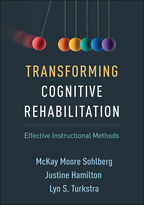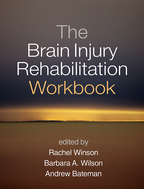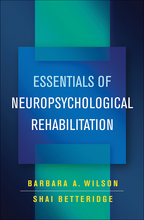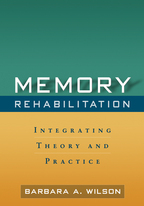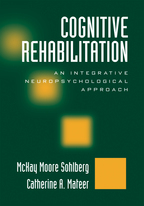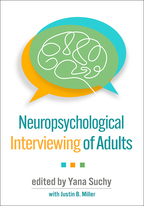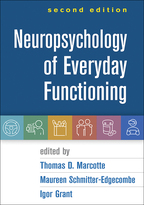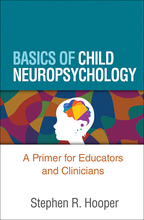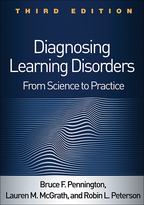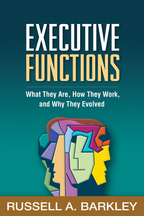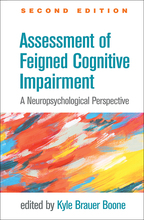Transforming Cognitive Rehabilitation
Effective Instructional Methods
McKay Moore Sohlberg, Justine Hamilton, and Lyn S. Turkstra
Hardcovere-bookprint + e-book
Hardcover
orderJanuary 25, 2023
ISBN 9781462550876
Price: $67.00 336 Pages
Size: 7" x 10"
e-book
orderNovember 7, 2022
PDF and Accessible ePub ?
Price: $67.00 336 Pages
ePub is Global Certified Accessible
print + e-book $134.00 $80.40
orderHardcover + e-Book (PDF and Accessible ePub) ?
Price: 336 Pages
ePub is Global Certified Accessible
“The authors have not just updated their previous work, but have completely reconceptualized the field of cognitive rehabilitation. This much-needed book demonstrates the need to transcend traditional boundaries, such as those between restoration and compensation or between individual cognitive processes. It presents a truly holistic approach to rehabilitation that is always person centered and that focuses on functional changes and individual empowerment. This book will be required reading for any graduate student, intern, or postdoctoral fellow interested in learning the theory and practice of cognitive rehabilitation. Even as a practitioner of 30 years, I learned quite a lot that I will incorporate into my clinical work and future research studies. The volume is jam-packed with case studies, handouts, checklists, and planning sheets that allow clinicians to easily apply the models and frameworks in their daily sessions.”

—Sarah A. Raskin, PhD, Charles A. Dana Professor of Psychology and Neuroscience, Trinity College
“It has been challenging to develop a coherent approach to cognitive rehabilitation, considering the complexity of human cognition, the many conditions that can affect it, and the varied goals of those we treat. This book surely lives up to its title, providing an integrated, transformative vision for the field and a set of systematic principles to guide practice in the face of evolving evidence. The authors' clinical recommendations are grounded in current research on learning and neuroplasticity, and organized in consistent procedural frameworks that support the clinician’s skill development. Case examples help clarify complex points in assessment and treatment planning. This book is an essential support resource for rehabilitation science faculty and students, as well as clinicians in practice.”

—John Whyte, MD, PhD, Institute Scientist Emeritus, Moss Rehabilitation Research Institute
“This book is a 'must read' for students in the health professions and will make an excellent foundational text for cognitive rehabilitation courses. Students will benefit from the foci on person-centered care, everyday life goals, and transfer of learning, and from the generous use of case examples. Clinicians working with clients with acquired brain injury will appreciate the up-to-date evidence and practical examples. The book introduces the Rehabilitation Treatment Specification System (RTSS), an important framework for developing cognitive rehabilitation interventions, and provides examples of RTSS application throughout.”

—Deirdre R. Dawson, PhD, Professor Emeritus, Department of Occupational Science and Occupational Therapy, and Rehabilitation Sciences Institute, University of Toronto, Canada
“This remarkable book goes beyond a summary of current evidence-based practice to address the complexities of cognitive rehabilitation. It includes methods to adjust therapies in light of psychological, social, and cultural factors, and ways to provide meaningful, functional services in the acute care setting. While a number of books cover the process and/or rationale of cognitive rehabilitation (the 'what' and 'why'), few books cover implementation (the 'how'). Here you have in-depth coverage of all three, making this an indispensable resource for experienced clinicians, researchers, and students alike. A welcome addition to the literature that provides a roadmap for empowering and guiding clients toward functional change and increased well-being.”

—Donald L. MacLennan, MA, CCC-SLP, research speech–language pathologist, Minneapolis VA Health Care System
—Sarah A. Raskin, PhD, Charles A. Dana Professor of Psychology and Neuroscience, Trinity College
“It has been challenging to develop a coherent approach to cognitive rehabilitation, considering the complexity of human cognition, the many conditions that can affect it, and the varied goals of those we treat. This book surely lives up to its title, providing an integrated, transformative vision for the field and a set of systematic principles to guide practice in the face of evolving evidence. The authors' clinical recommendations are grounded in current research on learning and neuroplasticity, and organized in consistent procedural frameworks that support the clinician’s skill development. Case examples help clarify complex points in assessment and treatment planning. This book is an essential support resource for rehabilitation science faculty and students, as well as clinicians in practice.”
—John Whyte, MD, PhD, Institute Scientist Emeritus, Moss Rehabilitation Research Institute
“This book is a 'must read' for students in the health professions and will make an excellent foundational text for cognitive rehabilitation courses. Students will benefit from the foci on person-centered care, everyday life goals, and transfer of learning, and from the generous use of case examples. Clinicians working with clients with acquired brain injury will appreciate the up-to-date evidence and practical examples. The book introduces the Rehabilitation Treatment Specification System (RTSS), an important framework for developing cognitive rehabilitation interventions, and provides examples of RTSS application throughout.”
—Deirdre R. Dawson, PhD, Professor Emeritus, Department of Occupational Science and Occupational Therapy, and Rehabilitation Sciences Institute, University of Toronto, Canada
“This remarkable book goes beyond a summary of current evidence-based practice to address the complexities of cognitive rehabilitation. It includes methods to adjust therapies in light of psychological, social, and cultural factors, and ways to provide meaningful, functional services in the acute care setting. While a number of books cover the process and/or rationale of cognitive rehabilitation (the 'what' and 'why'), few books cover implementation (the 'how'). Here you have in-depth coverage of all three, making this an indispensable resource for experienced clinicians, researchers, and students alike. A welcome addition to the literature that provides a roadmap for empowering and guiding clients toward functional change and increased well-being.”
—Donald L. MacLennan, MA, CCC-SLP, research speech–language pathologist, Minneapolis VA Health Care System

